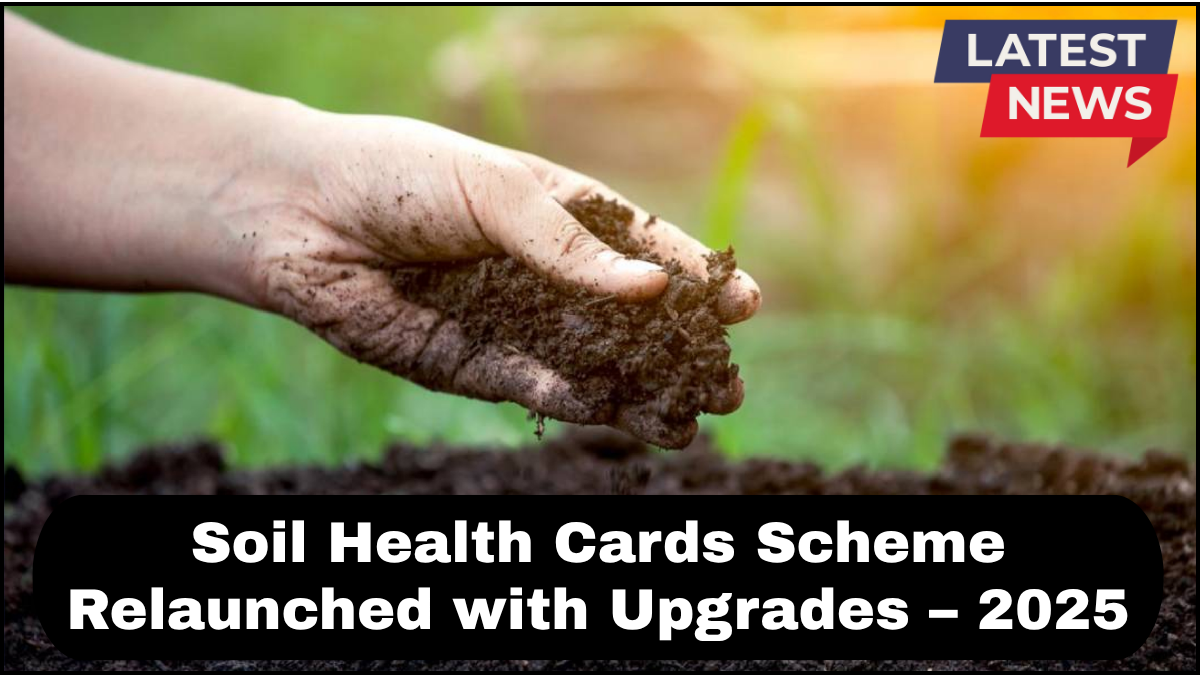The Government of India has officially relaunched the Soil Health Cards (SHC) Scheme in 2025 with significant upgrades aimed at revolutionizing soil management and boosting sustainable farming practices. Originally launched in 2015, the renewed initiative marks a major leap in agriculture reform, aligning with the country’s broader goals of ensuring food security, improving farmer income, and protecting the environment.

What is the Soil Health Cards Scheme?
The Soil Health Cards Scheme is a nationwide program designed to provide farmers with detailed reports on the health and nutrient status of their soil. Each card includes critical information on 12 soil parameters such as nitrogen, phosphorus, potassium, pH level, organic carbon, micronutrients, and more. Based on these assessments, farmers receive tailored recommendations for fertilizer and soil amendment use, ensuring better crop yields with optimized input costs.
The main objective is to shift farming practices from guesswork to science-based decisions, minimizing nutrient imbalances and reducing long-term soil degradation.
What’s New in the 2025 Relaunch?
The 2025 upgrade of the Soil Health Cards Scheme introduces several innovations that enhance both efficiency and accessibility:
1. Digital Integration and Real-Time Access
The relaunch emphasizes digitization, enabling real-time access to soil data through a dedicated mobile app and web portal. Farmers can now view their soil test results, fertilizer advisories, and crop-specific recommendations anytime, anywhere. This move not only empowers farmers but also integrates technology into grassroots agriculture reform.
2. AI-Based Recommendations
Artificial Intelligence (AI) and machine learning algorithms have been introduced to analyze historical soil data, weather patterns, and crop cycles. The system now delivers hyper-localized suggestions for nutrient management and irrigation, customized to each farmer’s land parcel.
3. Expanded Soil Testing Network
The scheme now includes over 1,000 upgraded soil testing labs equipped with advanced tools such as portable soil sensors, GPS mapping, and automatic sample tracking. These facilities drastically reduce turnaround time for soil analysis and improve the accuracy of reports.
4. Integration with Crop Insurance and Subsidy Schemes
For the first time, the Soil Health Card database will be linked with other agricultural platforms such as the Pradhan Mantri Fasal Bima Yojana (PMFBY) and input subsidy programs. This integration ensures that soil health is a foundational consideration for risk assessment and financial planning.
5. Localized Training and Farmer Education
To ensure widespread adoption, the government has rolled out training programs at the village level. Agricultural extension officers are being trained to assist farmers in interpreting soil data and applying the recommendations practically. Interactive workshops and demo farms will play a key role in driving behavioral change.
Why Soil Health Cards Matter for India’s Agriculture Future
India’s farmlands face growing threats from over-fertilization, monocropping, and declining organic matter. According to the Indian Council of Agricultural Research (ICAR), nearly 30% of cultivated soil in India is either acidic, saline, or deficient in key nutrients.
The Soil Health Cards offer a systemic approach to reversing this trend. They help farmers:
-
Cut unnecessary fertilizer costs
-
Improve yield through balanced nutrition
-
Increase profitability through precision farming
-
Promote long-term soil conservation
In the broader context of agriculture reform, this scheme aligns with the National Mission for Sustainable Agriculture (NMSA) and India’s commitments to climate-resilient farming.
The Road Ahead
While the relaunch is ambitious, its success depends on continuous monitoring, farmer engagement, and coordination between central and state governments. The upgraded SHC scheme has the potential to transform not just soil health but the entire agricultural value chain—from crop planning to marketing.
The government has allocated ₹2,200 crore for the upgraded program over the next five years, signaling a long-term commitment. Early pilot studies have already shown promising results, with some districts reporting up to 15% yield increases within one cropping season post-intervention.
FAQs
What is the main benefit of the Soil Health Cards Scheme?
The SHC Scheme helps farmers understand the nutrient condition of their soil, enabling them to use the right type and quantity of fertilizers. This reduces input costs and improves productivity.
How do farmers access their Soil Health Card in 2025?
Farmers can download their Soil Health Card via a mobile app or the official government website. The new digital system also sends SMS updates with key insights and advisories.
Is soil testing free under the SHC scheme?
Yes, the government provides soil testing and the issuance of Soil Health Cards free of cost to all farmers enrolled in the scheme.
How often is soil tested under the scheme?
Typically, soil testing is recommended every two years. However, with the 2025 upgrades, more frequent testing may be possible depending on the crop rotation and geographic region.
Can private labs participate in the Soil Health Cards program?
Yes, accredited private labs can now collaborate with government agencies to increase testing capacity and reduce backlogs.
click here to learn more